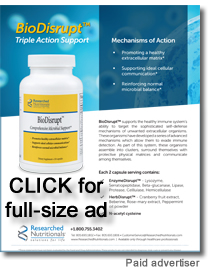|
Page 1, 2
Treatment of Pancreatic Cancer with Intravenous Vitamin C
A 68-year-old man with stage 4 metastatic pancreatic ductal adenocarcinoma refused conventional treatment and opted for intravenous vitamin C in doses of 75 to 125 g two to three times a week. Prior to receiving vitamin C treatment, he was screened for glucose-6-phosphate dehydrogenase (G6PD) deficiency and abnormal renal function, because high-dose vitamin C is contraindicated in patients with those conditions. He survived nearly four years, during which time he received more than 450 vitamin C infusions and had objective evidence of disease regression. His death was due to sepsis and organ failure from a bowel perforation.
Comment: In the 1970s, Linus Pauling and Ewan Cameron reported that daily administration of 10 g per day of vitamin C increased mean survival time by more than five-fold in patients with terminal cancer. During long-term follow-up, 8 of 100 vitamin C-treated patients were still alive, with a mean survival time of 3.5 years.1 The study by Pauling and Cameron was not a randomized controlled trial, so its results were met with skepticism. Two subsequent randomized controlled trials conducted at the Mayo Clinic failed to demonstrate any beneficial effect of high-dose vitamin C.2,3 However, the Mayo Clinic studies had important flaws, including early discontinuation of vitamin C treatment and the likelihood that many patients in the placebo group were surreptitiously taking high-dose vitamin C.4 Consequently, the question of whether vitamin C is an effective treatment for cancer remained unresolved.
Over the years, there have been sporadic case reports of dramatic responses to high-dose intravenous vitamin C. However, considering the large number of cancer patients that have received this treatment, such dramatic responses are probably uncommon. Nevertheless, vitamin C treatment appears to improve quality of life and may increase survival times. Further controlled trials are warranted to determine what role vitamin C has in the treatment of cancer.
Drisko JA, et al. Treatment of pancreatic cancer with intravenous vitamin C: a case report. Anticancer Drugs. 2018;29:373-379.
 Townsend Letter provides a platform for those examining and reporting on functional and integrative medicine. Please support these independent voices. Townsend Letter provides a platform for those examining and reporting on functional and integrative medicine. Please support these independent voices. |
More on Vitamin C as a Treatment for Cancer
Twenty patients with metastatic adenocarcinoma of the prostate who had not received chemotherapy, who had had disease progression despite ongoing androgen-deprivation therapy, and who did not have glucose-6-phosphate dehydrogenase (G6PD) deficiency were treated with weekly intravenous infusions of vitamin C for 12 weeks (week 1, 5 g; week 2, 30 g; weeks 3 through 12, 60 g). All patients received 500 mg per day of oral vitamin C for 26 weeks. At 12 weeks, the median prostate-specific antigen (PSA) concentration was 17 µg/L higher than before vitamin C administration. Five patients had a lower PSA level at 12 weeks than at baseline, and the maximum reduction was 27%. Three of 16 patients who had serial bone scans showed an improvement in the bone scan index (a measure of the proportion of the body skeleton with bony metastases) and in the number of high-probability bony lesions. No patient achieved the primary endpoint, which was a 50% reduction in the PSA level. Three adverse events were directly related to the treatment, all of which were related to fluid load.
Comment: The authors concluded that this study does not support the use of intravenous vitamin C to treat metastatic prostate cancer because none of the patients achieved a 50% reduction in the PSA level. However, the results are consistent with possible benefit in a substantial minority of patients. Longer-term studies are needed to determine whether vitamin C therapy affects survival times in patients with metastatic prostate cancer.
Nielsen TK, et al. Weekly ascorbic acid infusion in castration-resistant prostate cancer patients: a single-arm phase II trial. Transl Androl Urol. 2017;6:517-528.

Ginger for Chemotherapy-Induced Nausea
Fifty-one patients undergoing chemotherapy for cancer were randomly assigned to receive, in double-blind fashion, 300 mg of a ginger extract (standardized to contain 5% gingerols) or placebo four times per day with meals. Ginger or placebo was given for five days per chemotherapy cycle (beginning on the day of chemotherapy), for a total of three cycles. All patients received standard anti-emetic therapy. In chemotherapy cycle 1, compared with placebo, ginger treatment resulted in significantly better quality of life related to chemotherapy-induced nausea (p < 0.03), significantly better overall quality of life (p < 0.02), and significantly less fatigue (p = 0.006). There were no significant results in cycle 2. In cycle 3, overall qualityof life (p = 0.04) and fatigue (p < 0.02) were significantly better in the ginger group than in the placebo group. times per day with meals. Ginger or placebo was given for five days per chemotherapy cycle (beginning on the day of chemotherapy), for a total of three cycles. All patients received standard anti-emetic therapy. In chemotherapy cycle 1, compared with placebo, ginger treatment resulted in significantly better quality of life related to chemotherapy-induced nausea (p < 0.03), significantly better overall quality of life (p < 0.02), and significantly less fatigue (p = 0.006). There were no significant results in cycle 2. In cycle 3, overall qualityof life (p = 0.04) and fatigue (p < 0.02) were significantly better in the ginger group than in the placebo group.
Comment: The results of this study confirm previous research demonstrating that ginger is beneficial for the prevention of chemotherapy-induced nausea. There is no evidence that ginger interferes with the anticancer effects of chemotherapy.
Marx W, et al. The effect of a standardized ginger extract on chemotherapy-induced nausea-related quality of life in patients undergoing moderately or highly emetogenic chemotherapy: a double blind, randomized, placebo controlled trial. Nutrients. 2017;9:E867.

Folic Acid and Cancer Risk
In the China Stroke Primary Prevention Trial, 20,702 Chinese hypertensive adults without a history of stroke or myocardial infarction were randomly assigned to receive, in double-blind fashion, a single daily pill containing 10 mg of enalapril and 0.8 mg folic acid or 10 mg of enalapril alone (control group). During a median treatment period of 4.5 years, cancer occurred in 1.12% of participants in the folic acid group and 1.12% of participants in the enalapril group. There was no significant difference between groups for specific types of cancer (esophageal, gastric, breast, lung, colorectal, head and neck, liver, gynecologic, or lymphoma) and there was no difference in cancer mortality between groups. A significant 53% reduction in cancer risk was seen in folic acid-treated participants who had both the methylenetetrahydrofolate reductase (MTHFR) TT genotype and low folate levels (less than 9.0 ng/ml).
Comment: Numerous studies have been conducted on the effect of folic acid on cancer risk. The findings have ranged from a protective effect to no effect to an adverse effect. Some investigators have suggested that, in the short term, folic acid may accelerate the clinical expression of cancers that are already present, but in the long term it may prevent the development of cancer by enhancing immune function and by preventing DNA from mutating.5 In the present study with a relatively long treatment period, folic acid supplementation had no significant effect on overall cancer incidence or cancer-related mortality, but it appeared to have a protective effect in people with the combination of low folate status and a genetic polymorphism that increases folate requirements.
Qin X, et al. Effect of folic acid supplementation on cancer risk among adults with hypertension in China: A randomized clinical trial. Int J Cancer. 2017;141:837-847.

Probiotic for Function Constipation
Fifty-six adults (mean age, 44 years) with functional constipation and normal colonic transit time were randomly assigned to receive, in double-blind fashion, Lactobacillus reuteri DSM 17938 or placebo for 15 weeks. The dosage was four tablets per day between meals for 15 days, then two tablets per day between meals for 90 days. Each probiotic tablet contained at least 108 colony-forming units. Compared with placebo, the probiotic significantly decreased the mean severity of constipation on day 60 (p < 0.005) and day 105 (p = 0.001), but not on day 15. The mean improvement at the end of the trial compared with baseline was 41.5% in the probiotic group and 10.2% in the placebo group.
Comment: Functional constipation, also known as chronic idiopathic constipation, is defined as constipation that is not due to an identifiable anatomical abnormality or medical condition. L. reuteri DSM 17938 is a probiotic strain originally derived from breast milk. It has been found to be effective for preventing and treating infantile colic, for treating acute gastroenteritis in children, for treating functional abdominal pain in children, and for preventing dental caries. The present study found that this probiotic organism is also an effective treatment for functional constipation in adults. L. reuteri DSM 17938 is sold in the United States under the brand name Gerber Soothe Colic Drops.
Riezzo G, et al. Randomised double blind placebo controlled trial on Lactobacillus reuteri DSM 17938: improvement in symptoms and bowel habit in functional constipation. Benef Microbes. 2018;9:51-60.

Should Meso-Zeaxanthin Be Included in Nutritional Formulas for Eye Health?
One hundred twenty-one patients with non-advanced age-related macular degeneration were randomly assigned to receive daily, in double-blind fashion, the Age-Related Eye Disease Study (AREDS 2) formula with a low dose of zinc (25 mg) or the same formula with the addition of 10 mg of meso-zeaxanthin for two years. The AREDS 2 formula provides daily 10 mg of lutein and 2 mg of zeaxanthin. Both groups had significant improvements in contrast sensitivity at six cycles per degree (the primary outcome measure), in other measures of contrast sensitivity and visual function, and in the amount of macular pigment. However, the degree of improvement in the various endpoints did not differ significantly between groups.
Comment: Macular pigment contains three carotenoids: lutein, zeaxanthin, and meso-zeaxanthin. These carotenoids filter the phototoxic blue-light portion of the sun's rays, and thereby appear to prevent the development of age-related macular degeneration. Meso-zeaxanthin is the main carotenoid at the center of the macula, and it expands the range of blue light filtration over that provided by lutein and zeaxanthin. There is little research on the meso-zeaxanthin content of foods, although it has been found in the skin of certain types of seafood. While the typical diet may contain little or no meso-zeaxanthin, this carotenoid is believed to be synthesized in the retina from lutein.
In a previous study of patients with early age-related macular degeneration, the addition of meso-zeaxanthin to a supplement containing lutein and zeaxanthin improved contrast sensitivity to a greater extent than lutein and zeaxanthin without meso-zeaxanthin.6 However, the beneficial effect of meso-zeaxanthin appeared to be modest, and it was not stated whether the difference in the change between treatments was statistically significant. In the new study, the addition of meso-zeaxanthin to the AREDS 2 formula with a low dose of zinc did not increase the efficacy of the formula. Therefore, it remains unclear whether meso-zeaxanthin should be included in nutrient formulas designed to prevent and treat age-related macular degeneration.
Akuffo KO, et al. The impact of supplemental antioxidants on visual function in nonadvanced age-related macular degeneration: a head-to-head randomized clinical trial. Invest Ophthalmol Vis Sci. 2017;58:5347-5360.
Page 1, 2
|
![]()
![]()
![]()
![]()






